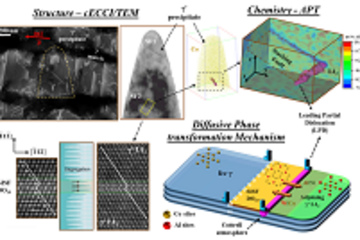All genres
561.
Talk
Resolving grain boundary phase transformations by advanced STEM for fcc metals and multinary alloys. 6th International Symposium on Metastable, Amorphous and Nanostructured Materials (ISMANAM-2019), Chennai, India (2019)
562.
Talk
Micro- and Nanomechanical Testing of Materials - From Materials Physics to Materials Design. Convegno Nazionale INSTM XII, Ischia Porto, Italy (2019)
563.
Talk
Microstructure and thermomechanical deformation of CrFeCoNi equiatomic CCA thin films. 26th International Symposium on Metastable, Amorphous and
Nanostructured Materials ISMANAM - 19, Chennai, India (2019)
564.
Talk
Experimental discovery of grain boundary phase transformations unveiled by atomistic simulations. PICS3 2019 Meeting, Centre Interdisciplinaire de Nanoscience de Marseille, Marseille, France (2019)
565.
Talk
Do we understand the interplay of microstructure and properties of materials: New insights by advanced microscopy techniques. MPI CPFS, Dresden, Germany (2019)
566.
Talk
High temperature mechanical characterization of binary Cu–X alloys produced by Combinatorial Synthesis. International conference on metallurgical coatings and thin films (ICMCTF) 2019, San Diego, CA, USA (2019)
567.
Talk
Advances in automatic TEM based orientation mapping with precession electron diffraction. Joint Max-Planck-Institut für Eisenforschung MPIE) / Ernst Ruska-Centre (ER-C) Workshop, Düsseldorf, Germany (2019)
568.
Talk
Hydrogen-metal interactions by in-situ and ex-situ nanoindentation. 2nd LINCET Symposium, Downing College, Cambridge, UK (2019)
569.
Talk
Slip transmission across multiple coherent twin boundaries in nanotwinned Ag. Seminar on "Slip Transmission in nanotwinned Ag", Indian Institute of Science, Department of Materials Engineering, Bangalore, India (2019)
570.
Talk
Towards understanding dislocation based plasticity in high entropy alloys by in-situ TEM. DPG Frühjahrstagung, Regensburg, Germany (2019)
571.
Talk
Slip transmission across multiple coherent twin boundaries in nanotwinned Ag. Seminar on "Slip Transmission in nanotwinned Ag", Indian Institute of Technology, Mumbai, India (2019)
572.
Talk
Grain boundary phase transformations in Cu: New insights by advanced STEM. 65. Metallkunde-Kolloquium, Lech am Arlberg, Austria (2019)
573.
Talk
Exploration of interfacial transitions by correlating atomic scale microscopy with atomistic simulations. TMS 2019 Annual Meeting & Exhibition, San Antonio, TX, USA (2019)
574.
Talk
Asymmetric Line Segregation at Faceted Si Grain Boundaries. TMS 2019 Annual Meeting & Exhibition, San Antonio, TX, USA (2019)
575.
Talk
Severe deformation of a lamellar microstructure: pearlitic steel as a case study. TMS 2019 Annual Meeting & Exhibition, San Antonio, TX, USA (2019)
576.
Talk
Ag segregation induced nanofaceting transition of a Cu grain boundary. Scientific Advisory Board Meeting 2019 , Düsseldorf, Germany (2019)
577.
Talk
Können hohe Festigkeit und Zähigkeit in Verschleißschutzschichten kombiniert werden? Eine grundlegende Untersuchung an Mo2BC. 12. Tagung Gefüge und Bruch, Bochum, Germany (2019)
578.
Talk
Ni–P: Microstructure and micro-compression. Nanomechanical Testing in Materials Research and Development VII
, Malaga, Spain (2019)
579.
Talk
On microstructural constraints for slip transfer in nanotwinned silver. ECI conference on nanomechanical testing in materials research and development VII, Malaga, Spain (2019)
580.
Talk
Composition Dependence of Mechanical Properties of the Cubic and Hexagonal NbCo2 Laves Phases Studied by Micromechanical Testing. International Workshop on Laves Phases, Düsseldorf, Germany (2019)











